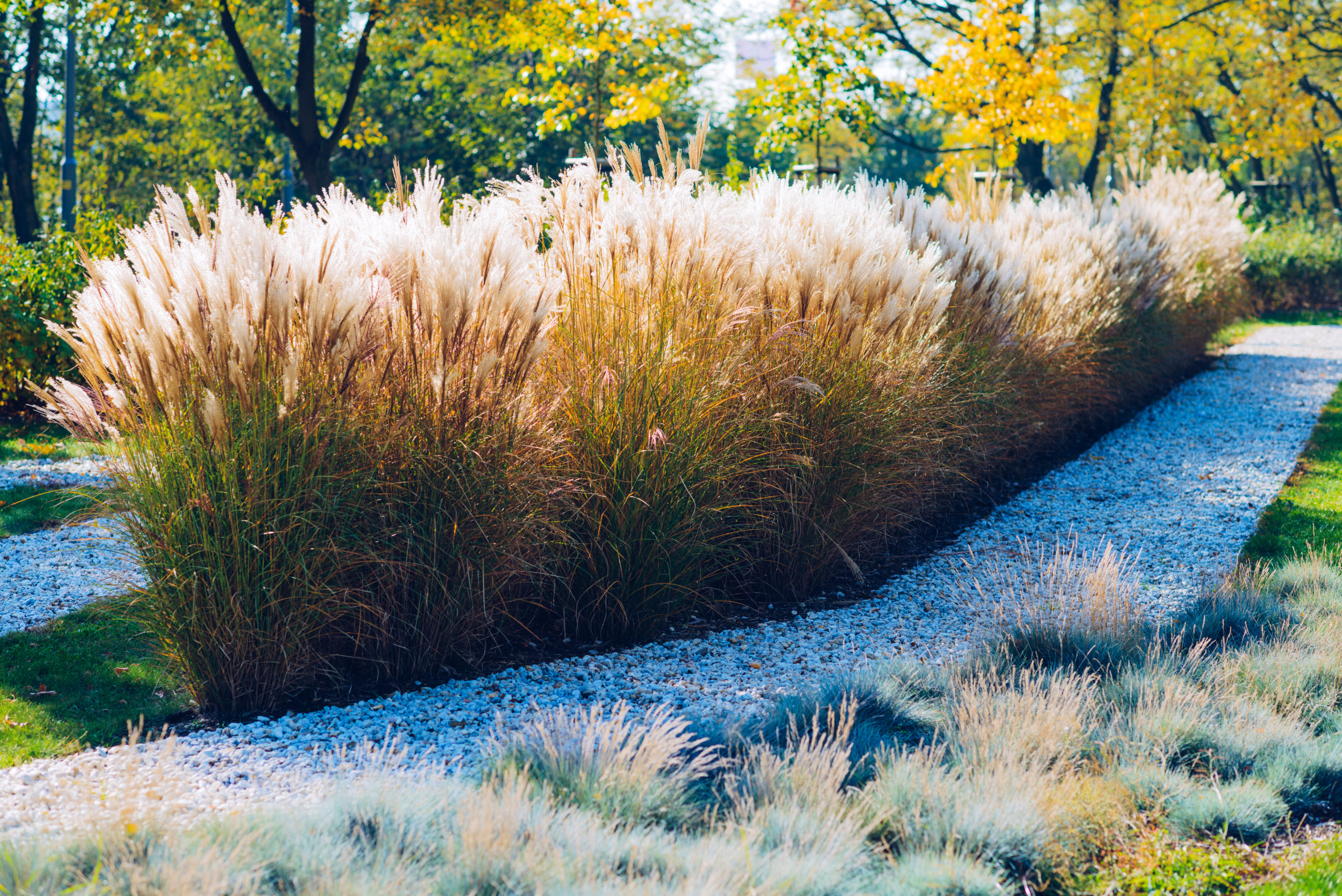Your Guide To Ornamental Grasses
Ornamental Grasses are among the most versatile and useful plants in any garden. They add movement, texture and colour throughout the summer, and continue to offer interest and beauty throughout the fall and into winter. Easy to use, and easy to grow, they earn their place with their low-maintenance presence. Diminutive and detailed, or giant and graceful, there’s a grass that’s perfect for a space in your garden.
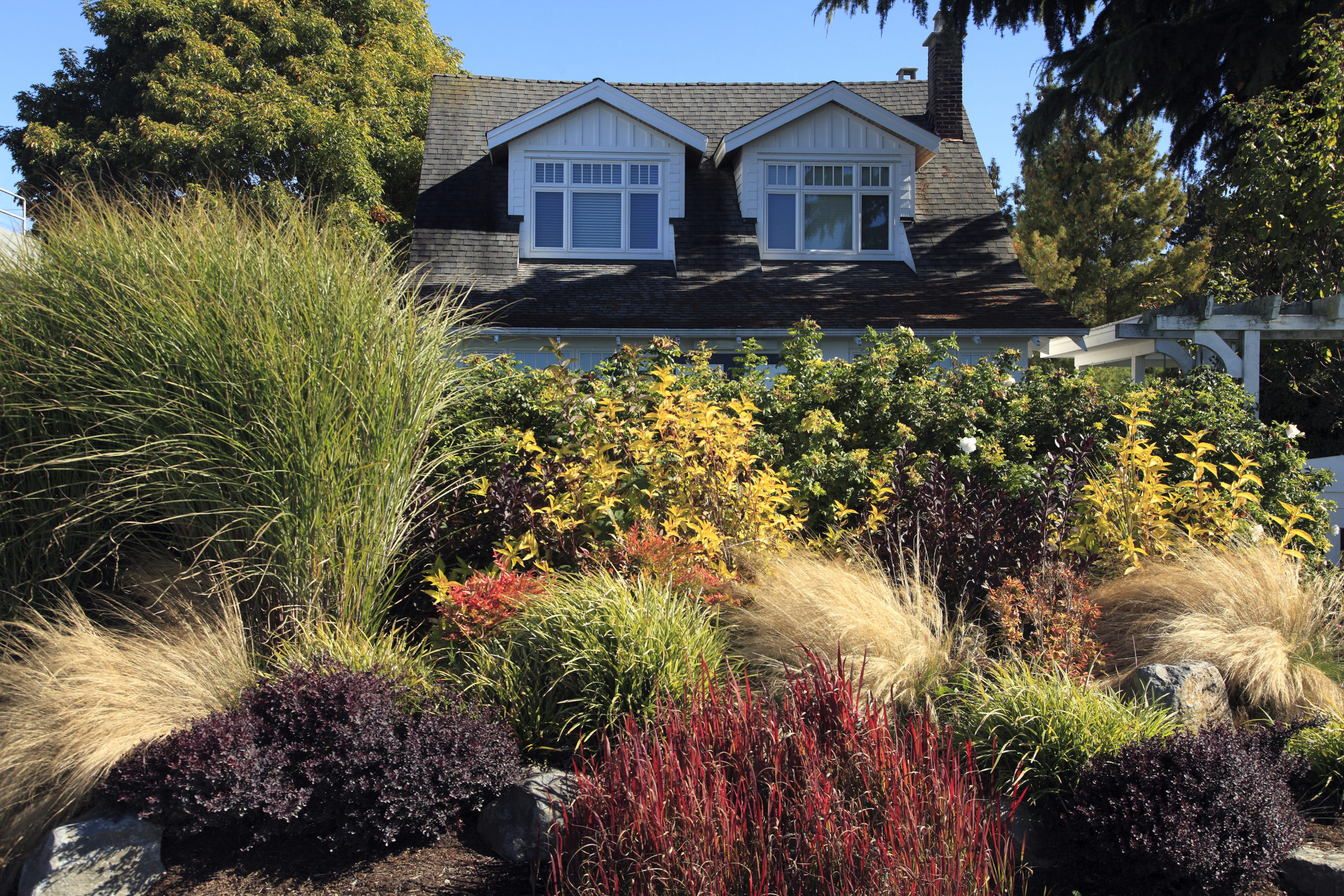
Tiny Dancers – Dwarf And Compact Varieties
Ornamental grasses come in all sorts of sizes and shapes. Smaller, rounder dwarf varieties are perfect for the front of the border, small container accents, or used for edging in tidy rows or groups. Try a few of our classic favourites.
Blue Fescue ‘Elijah Blue’
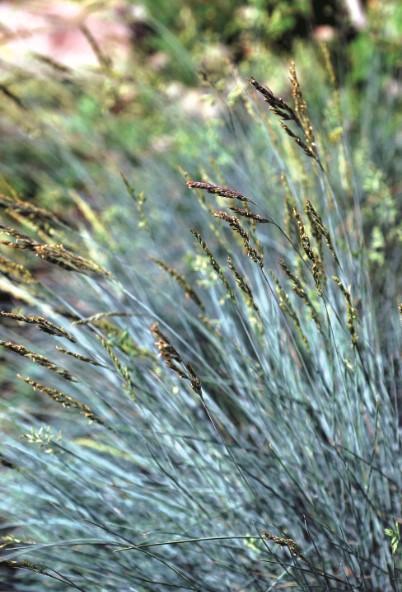
Blue Fescue grass is valued for its clumping habit, and stunning display of colourful, grey-blue foliage. In the garden, it has a rounded mound shape. Tan flower spikes appear in early summer, and persist as an interesting feature throughout the fall and into winter. Excellent for mass planting, edging, as a feature on walkways or paths, or in the rock garden.
At maturity, this grass grows to 12-14’″ high and wide. For healthiest growth and brightest colour, plant in areas that get full sun daily (that’s 6 or more hours.)
Japanese Blood Grass – Imperata ‘Red Baron’
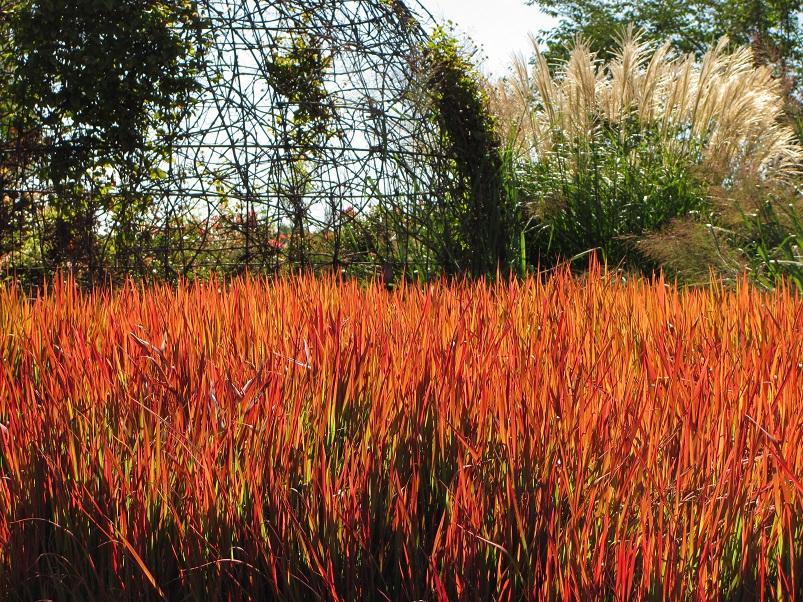
This grass is dramatic! Green at the base, the red tips become more intense over the summer and into fall. From September into frost, this grass blazes in the landscape as a flaming orange-red. It grows vigorously when planted in full sun to part shade. Japanese Blood Grass offers an attractive textural element, especially in a border or planted in groups to create drifts or meadows. In winter, foliage will remain present if left untrimmed, with papery brown leaves and flower spikes to offer visual interest. ‘Red Baron’ grows 18″ high and 12″ wide.
Pennisetum (Fountain Grass)

Fountain Grass is popular particularly for it’s flowers. ‘Hameln’ forms an upright mound of arching green leaves, bearing bottlebrush spikes of silvery-white flowers that turn to buff or tan as they dry. This variety grows best in full sun, and is drought tolerant once established in the garden.
Made For Shade – Shade-Tolerant Grasses
While most grasses prefer full sun, these beauties add colour and texture to shady spaces.
Japanese Forest Grass (Hakonechloa)
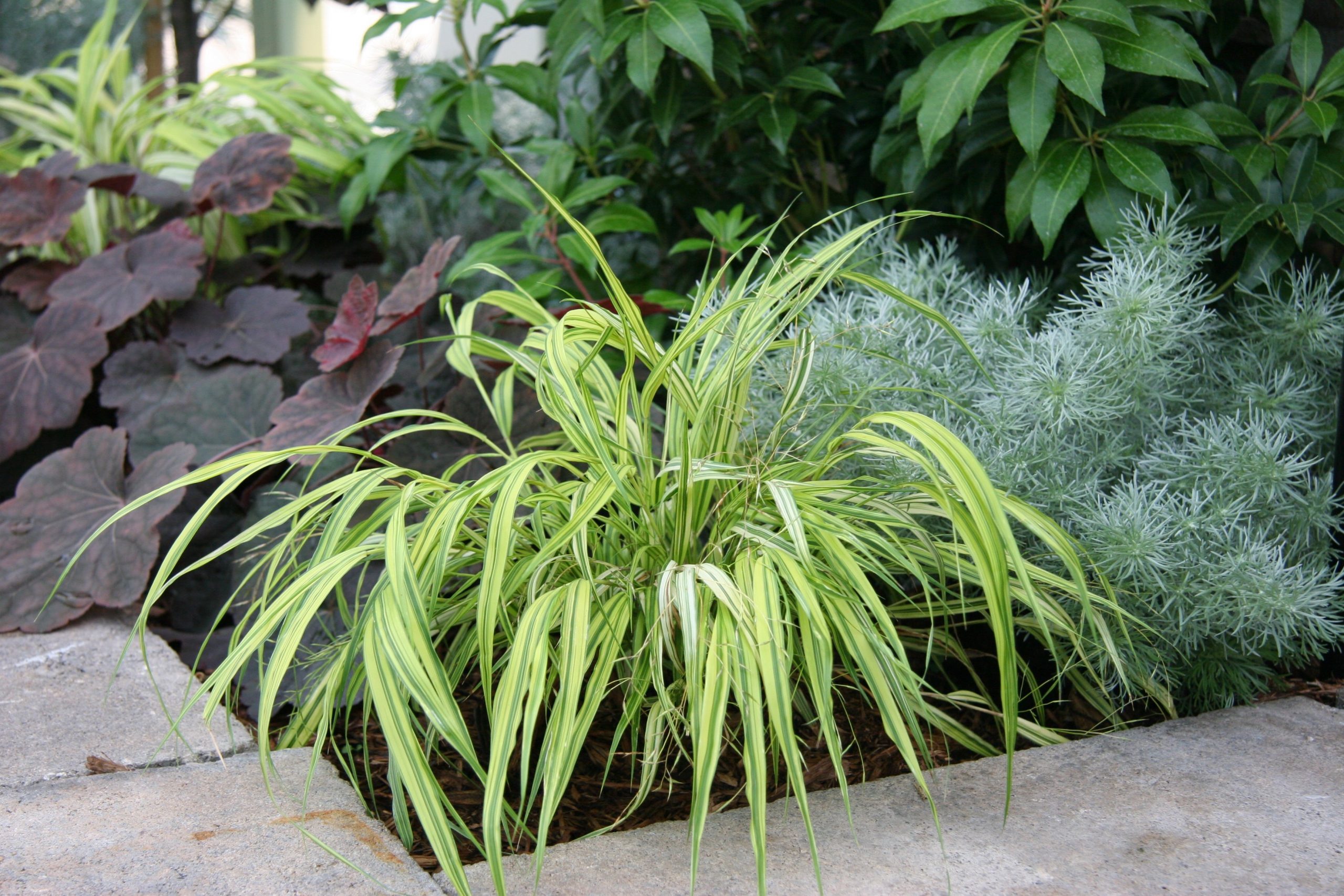
Hakonechloa is one of the most gorgeous types of ornamental grasses, and also one of the few that prefers shady sites. This interesting grass forms a low mound of arching stems, with cascading layers of narrow leaves striped with bright yellow and green. The graceful effect is similar to a dwarf bamboo, but without any invasive tendencies. Clumps are slow to grow, but eventually make a spectacular border edging or striking focal plant.
Hakonechloa combines beautifully with Hostas or ferns, since all three have similar growth requirements. This grass prefers moist soil, and enjoys a mulched surface planted in shady or partially shaded spaces. ‘Aureola’ grows to 18″ high and 20″ wide.
Landscape Stars – Outstanding Garden Grasses
These mid-size grasses mature to 4-5’ tall and are favoured by landscape designers for their commanding presence and architectural appeal.
Calamagrostis ‘Karl Foerster’

This might be the MOST popular grass for large landscapes and places where a tough, tidy, attractive plant is needed. ‘Karl Foerster’ is an upright selection of perennial Feather Reed Grass, with dark green leaves, and wheat coloured, stiff plumes in summer, which last into winter. One of the earliest ornamental grasses to emerge in spring, it grows quickly in the early part of the season and then remains steadfast into winter.
Left to stand through the snowy months, it stays somewhat upright and buff coloured for shape in the winter garden. This grass is well suited to mass planting, but can be used as a specimen as well. ‘Karl Foerster’ grows to 48″ tall and 24″ wide, and prefers full sun.
Miscanthus (Maiden Grass)

There are many selections of Miscanthus now available, but ‘Gracillius’ is by far the most popular of all. Plants form a graceful, upright mound of narrow green foliage that stays attractive from summer right through the winter. Coppery-pink plumes appear in late fall, although sometimes not at all in cool summer regions. The foliage dries and turns a light tan shade for the winter. Useful as a specimen, in the border, or for mass planting.
Homegrown Heroes – Switch Grasses
The Panicum (Switch Grass) species of ornamental grasses are native to Ontario, and even cultivated varieties help to benefit local birds and pollinators AND your garden design.
Panicum ‘Northwind’
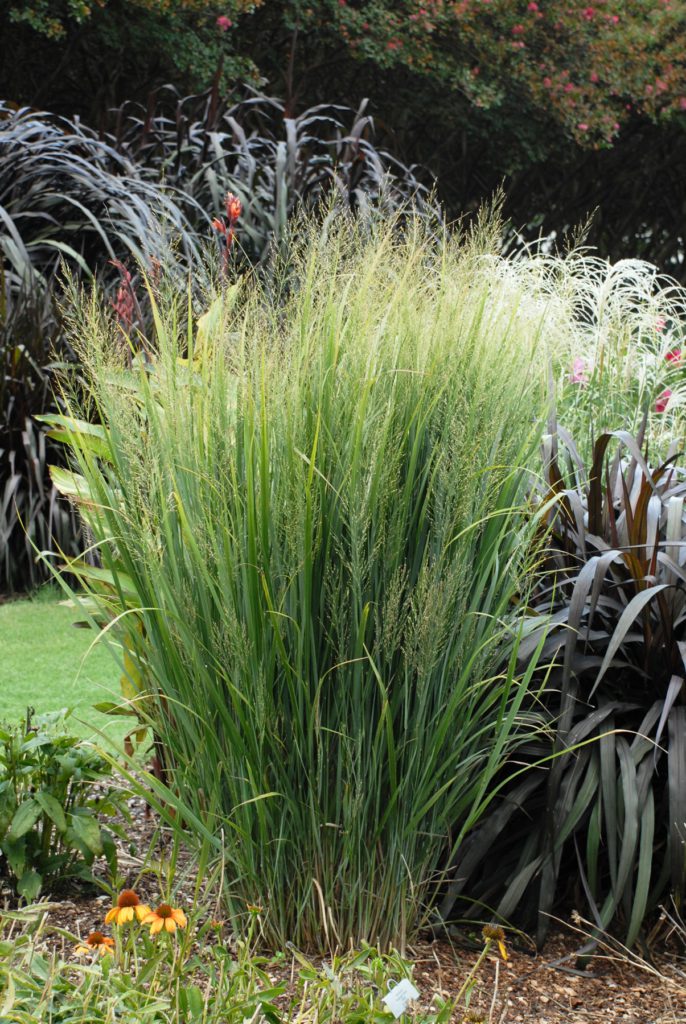
Switch Grass is one of the easiest and most attractive ornamental grasses, with no tendency to spread or become troublesome. Panicum ‘Northwind’ forms a tall, narrow mound of olive-green leaves, bearing airy heads of tiny green flowers in late summer. In Fall, the change in colour is unique and striking, a brilliant golden yellow, fading to tan after hard frost. The upright habit is attractive in the garden all winter long, and provides protection and perch for birds. The fireworks-shaped flowers are good for use as a cut flower accent, used either fresh or dried. Trim down to the ground in early spring. Clumps can be divided and replanted in spring. Drought tolerant once established. Grows 4′ high and 2.5′ wide.
Panicum ‘Blood Brothers’
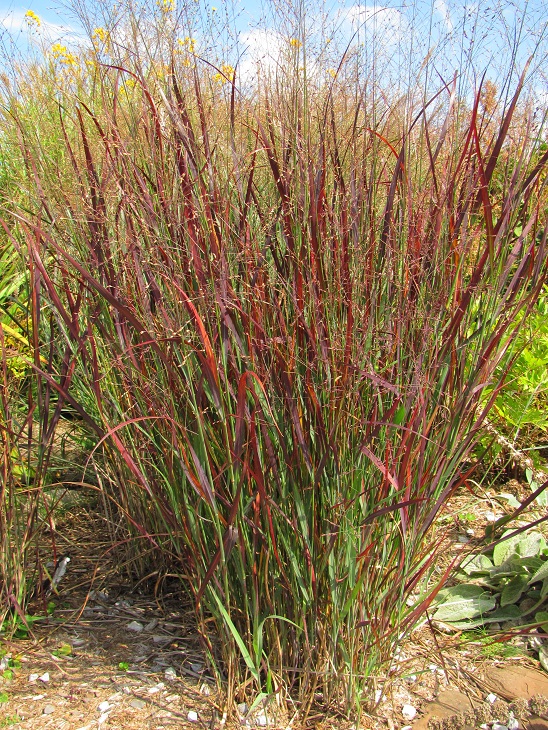
A Canadian introduction, this Switch Grass develops outstanding red foliage colour. It forms an upright, slightly vase-shaped mound of green-blue leaves, the tips developing blood-red tones by midsummer that get better through the autumn. Sprays of small reddish flowers develop into tan seedheads by late fall. The plant remains sturdy and attractive well into winter, and is a great addition in a sunny border.
Discovered by Canadian gardener Dale Smith as a sport of ‘Heavy Metal’ in her former garden near St. Thomas, Ontario.
